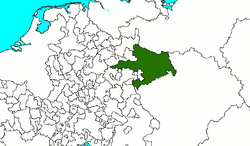Electoral Saxony Timeline: The Once and Never Kings
OTL equivalent: Electorate of Saxony | |||||
|---|---|---|---|---|---|
|
|||||
| Location of Electoral Saxony in green.
|
|||||
| Capital | Dresden | ||||
| Official languages | (Saxon) German | ||||
| Demonym | Saxon | ||||
| Religion | Catholicism | ||||
| Government | Unitary Constitutional Monarchy | ||||
| - | Elector | Ernst Augustus VII | |||
| Establishment | |||||
| - | Golden Bull | 1356 | |||
| - | Extinction of the Ascanian Dynasty | 1422 | |||
| Currency | Saxon Thaler | ||||
The Grand Duchy of Saxony, Electoral Saxony, is a medium sized constitutional monarchy in the east-central Holy Roman Empire. It borders the Imperial states of Austria-Bohemia, Prussia, Magdeburg, Anhalt, Mansfield, Ducal Saxony, and Bayreuth.
History[]
The largest successor state of the medieval Duchy of Saxony, the region today known Saxony began as a small collection of land around the town of Wittenburg. Saxony was given to the Ascanian family after the deposing of the Welf Henry the Lion. The Ascanians were already the Lords of Lauenburg, and so added saxony to their realm. When Saxony and Lauenburg were divided between brothers, both lines claimed the Saxon electoral powers. This caused confusion when Imperial elections came around, possibly most famously in 1314 when the two branches voted for opposing candidates.
The issue was resolved in 1356 when the Luxembourg Emperor Charles IV affirmed the Saxe-Wittenburg as having the Saxon Electoral dignity.
The Wittenburg Ascanian line went extinct in 1422. Despite pressure from Saxe-Lauenburg, Electoral Saxony was given to the Wettin Margraves of Meissen. In 1485, after the death of Elector Frederick II, Saxony was divided between his sons Ernst and Albert. Ernst, being the elder, took much of the old Saxe-Wittenburg and southern Thuringia as well as the Electoral power, while Albert took Meissen and northern Thuringia.
The Protestant Reformation began in Ernestine Saxony when Martin Luther nailed his 95 Theses to the door of the Cathedral of Wittenburg. The Reformation only deepened the rivalry growing between the Ernestine and Albertine branches, as Albertine Saxony remained steadfastly Catholic.
Indeed, they would join the Schmalkaldic War on opposing sides, and upon the Catholic victory, much of Ernestine Saxonys land (coincidently including Wittenburg) and the electoral power was transferred to the Albertine line. The new Electoral Saxony was also forbidden to divide its land in inheritance, a privilege that did not extend to the Ernestine line, who saw their lands divided and semi-reunified through the centuries.
Electoral Saxony was initially neutral in the Forty Years War, but declared war on the Protestant League in 1634 when a Brandenburg-Prussian army sacked Meissen. Its entrance was checked by the near-simultaneous declaration of war by the Ernestine duchies.
The opposing Saxonys fought each other with tremendous brutality, often fighting more ferocious than they did against their main opposing armies. As the war dragged on, it lost its religious element, and devolved more into an issue of "settling scores". The only things that stopped the clashes were the bankruptcies the repeated sacking and looting brought to both entities, and the Peace of Hamburg in 1658.
Since the Forty Years War, Saxony has further engaged in diplomacy outside of the Holy Roman Empire, culminating in the Polish Sejm electing Frederick Augustus I to the Commonwealths throne. Looking to take advantage of the Austro-Prussian War to seize Silesia and connect the lands, his son, Frederick Augustus II declared war.
Despite some relative early success in a March on Breslau, Saxony-Poland was soon facing a broad, unexpected Imperial coalition including Austria, Prussia, Luxembourg, and the Hansa, Saxony proper was swiftly overrun, and Warsaw fell several weeks later. The personal union was broken in the peace, and both were forbidden from doing such a union again.
Looking for revenge, Electoral Saxony joined Napoleone di Buonaparte in the Napoleonic Wars, though saw much smaller success than their ally. When Napoleone's Italy fell in 1857, Saxony was stripped of Lusatia, and it was taken by Austria.
Since then, Saxony has toned down its visibility, content with the rather sporadic times a Wettin is elected Emperor.
Government[]
Electoral Saxony is a unitary state, divided into 59 districts, and governed by a single chambered legislature. The Elector still retains several powers, and his signature is required to pass legislation.
| ||||||||||||||||||||||||||||||||||||
| |||||||||||||||||||||||||||





